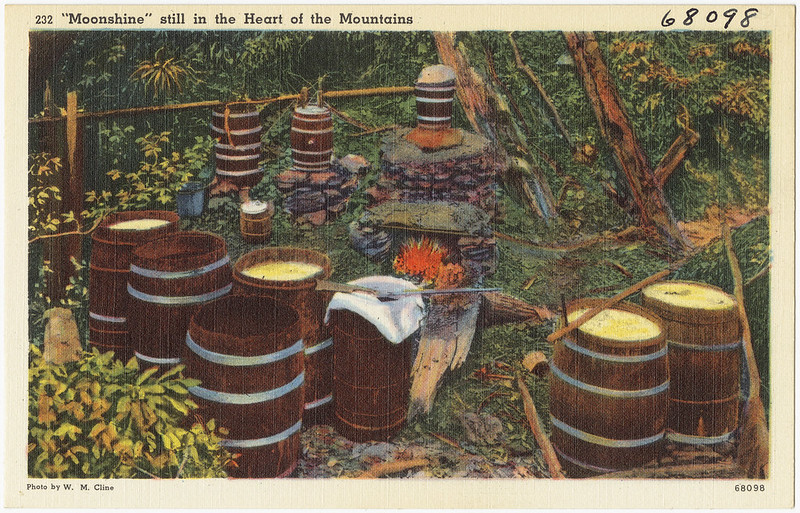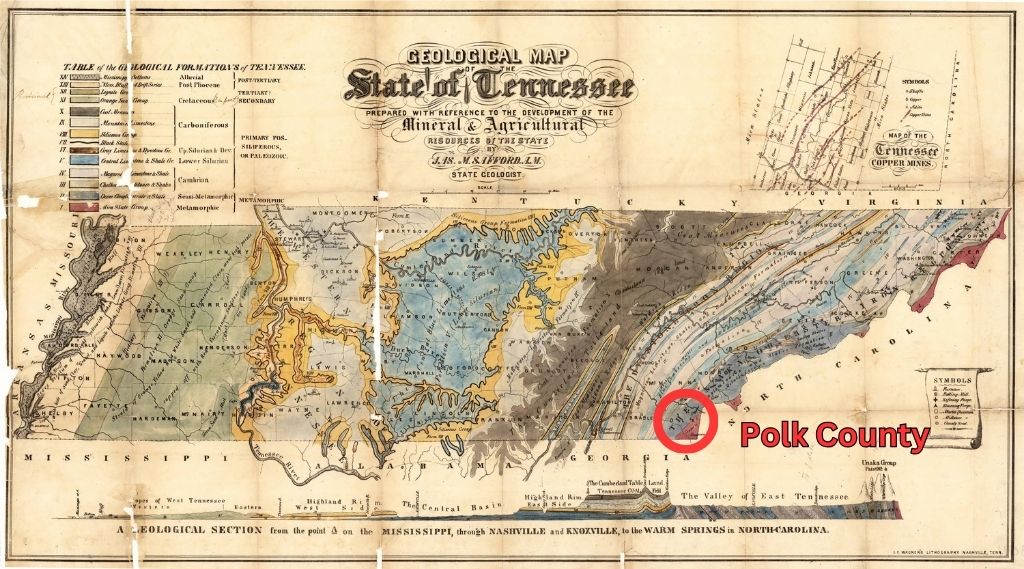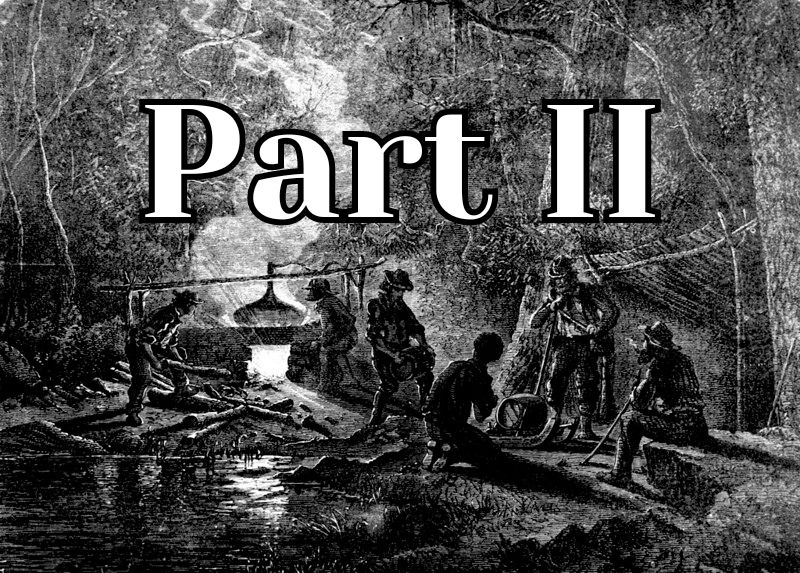In part one, we met Garrett Hedden and his brothers, Bill, Joe, and Riley. All of them were moonshiners who followed in the footsteps of their father, John. Garrett had killed multiple men, including his brother, Bill, in 1898, and in 1900, he fought a party of seven revenue agents to a standstill in a shootout.
Newspapers claimed that lawmen were afraid to attempt his capture, allowing him to roam the countryside and towns unmolested. While relatively safe from law enforcement, he got into a drunken argument with his brother Riley, who stabbed him through the chest. On March 11, 1903, multiple newspapers reported that the outlaw was on his deathbed with no hope of recovery. Some papers printed that he was dead. Garrett made his 10-year-old son swear on a pistol to kill Riley when the child was old enough and big enough to accomplish the murder. This oath of vengeance made its way into newspapers across the country.
On March 26, the Knoxville Sentinel carried the news that Garrett Hedden was still alive, recovering from his wound, and he had a new goal: murder. From the paper:
“He is said to have made the statement to his physician, Dr. Nuchols, that he hoped to get well so he could kill his brother.”
Like the library scene from Indiana Jones and the Last Crusade, you can almost hear the Canceled Stamp slam down on Riley Hedden’s life insurance policy. Somehow, Riley was able to stay out of rifle range over the next few years.
In 1905, Riley was tried for criminally assaulting a 17-year-old girl. The trial resulted in a hung jury, but he would most likely have been in jail for that term of court. In 1907, he was retried, convicted, and sentenced to 10 years in the penitentiary. Presumably, Riley spent the interval between these two trials on the move, sleeping with one eye open and reading up on the bulletproof vest Polish inventor Jan Szczepanik developed in 1901.

“Bring a Coffin.”
On Friday night, January 3, 1908, Polk County Sheriff Burch E. Biggs and his deputies boarded the L & N train at Benton and traveled to Etowah, where they met Sheriff Pryor Watson of Monroe County and his deputies. The six-man posse was on its way to arrest Garrett Hedden for the murder of Bill Hedden 10 years earlier and to locate and destroy the illegal distillery he had been operating on Lost Creek about three miles north of Reliance, TN, for several years.
Over the years, Tennessee newspapers noted that officers seemed reluctant to confront Garrett. Sheriff Biggs appeared to be the exception. The Chattanooga Daily Times reported that the sheriff was determined to arrest the moonshiner before his term in office expired.
An article in the January 9 Knoxville Sentinel claimed that Garrett had warned the sheriff against attempting to arrest him.
“According to report, Hedden had more than once sent word to Sherriff Biggs of Polk County that if the officer should ever come after him, ‘he better bring along a coffin.’”
It was raining that Saturday morning, soaking the leaves and underbrush around Lost Creek, greatly reducing the noise made by the raiding party as they closed in on the still. An article on knoxfocus.com said the posse had a guide. A 1924 article in the Nashville Banner said the rain drove a guard posted by Hedden to shelter under a cliff to get out of the downpour, allowing the posse to crawl through the underbrush within 20 yards of the “illicit distillery, which was well-fortified” and surround it.
Garrett was seen exiting the still house, and when he had gotten about ten steps from it, Biggs called out for him to throw up his hands. Instead, the moonshiner turned and ran for the still house. Unwilling to chance, Garrett reaching cover and retrieving his Winchester, the posse opened fire. From the Chattanooga Daily Times:
“Just as he entered the door, the sheriff gave the command to fire, and the whole posse fired, the volley of buckshot completely riddling the mountaineer’s body from head to heel. When later picked up, his whole back was found to be perforated with buckshot.”
Garrett’s 16-year-old son, Charles, was wounded in the arm, and his 18-year-old nephew, John, was shot in the chest or abdomen and died shortly afterward. John was the son of Bill Hedden, the brother Garrett was wanted for killing. Some accounts say Charles and John were shot when they tried to run into the still house to reach rifles and shotguns stored there. Other accounts say they exchanged gunfire with the posse.
From The Boss of Polk County: Burch Biggs: “(Hedden) was a prolific killer, charged with no less than nine murders. In later years, Burch Biggs recalled, ‘He had threatened to make me the tenth.’”
Thus ended the life and career of Garrett Hedden, the meanest moonshiner in Tennessee or certainly one of the deadliest. His two remaining brothers, Riley and Joe, would also die in shootouts, one in an altercation with a deputy sheriff and the other in a fight with a family member. Both were drunk when they died.

Ducktown Street Stained with Blood
On the night of December 26, 1914, Deputy Sheriff Joe Williams fatally shot Joe Hedden, who was resisting arrest on charges of public drunkenness. Hedden had repeatedly made threats against Williams, who had been a member of the posse that shot and killed Garrett six years earlier. There were claims he went looking for Williams on Christmas night but did not find him because the deputy was in Copper Hill.
Williams had encountered Hedden on the street near the drugstore and moved to arrest him, but Hedden rushed home, and his wife convinced the deputy not to go in after him. He agreed, provided Hedden stayed off the streets for the rest of the night. A short while later, Williams reencountered him and moved to arrest him. A scuffle ensued, with Hedden getting hold of Williams’ pistol. In the struggle, three shots were fired; one missed, but the other two hit Hedden in the abdomen. He died within an hour of the confrontation.
In February 1910, Riley was pardoned by Governor Patterson after serving three years of his 10-year sentence for attempted rape. Arriving back in Benton, he made a statement that he intended to be a better man. While he managed to stay out of trouble or at least out of the newspapers for several years; unfortunately, his change of heart didn’t last.
In August 1922, Riley cut and stabbed Deputy Sheriff Clyde Harper during the election in the Greasy Creek precinct. Harper heard Hedden talking and swearing at a store, causing a female clerk to go home, but he refrained from arresting him on the advice of the storekeeper. Later, he encountered Riley outside the polling place, arguing fiercely with his nephew, Sidney Merrill, over who Merrill should vote for. When Harper stepped in to put a stop to this clear violation, Riley stabbed him.
After two trials and the passage of more than a year, Hedden was found guilty and sentenced to six months in the county workhouse and a $50 fine. Three state witnesses swore Hedden was drunk, but the defense called a half dozen witnesses claiming that he was sober. I’ll let you decide which party was telling the truth.
Fates: Predictable and Otherwise
On the night of Wednesday, June 11, 1924, liquor finally killed Riley Hedden, or at least led to his death. He was at home near Archville, drinking with friends, when he flew into a drunken rage and started shooting. He shot Willie Rymer through the thigh and Ross Bredden in the leg. He then opened fire on his 24-year-old son, Bill, who fled to another room, grabbed a shotgun, and shot Riley twice.
One way or another, whiskey had led to the deaths of all four of the Hedden brothers. None of them lived past the age of 52. Charles Hedden, Garrett’s son wounded during the 1908 raid, served in WWI and became a copper miner. He died in 1949 at the age of 55 from tubulin pulmonary silicosis. Riley’s son, Bill, became a constable, a deputy sheriff, and eventually a miner. In a shocking turn, he was convicted of a triple homicide involving the shooting deaths of two women and a 14-month-old boy. Bill Hedden died in Tennessee’s electric chair on March 30, 1943, at the age of 44. He maintained his innocence until the end.
In his article, The Moonshiner at Home, Leonidas Hubbard Jr. proved to be a pretty fair prophet when he wrote about Garrett:
“Some day, he will walk out of the cabin, never to come back. If he is the man his neighbors believe, he will die with a smoking rifle in his hands and the lust of battle in his heart. But, however, he may die, his children grow up to carry weapons and distill forbidden liquors.”
What Hubbard didn’t know was that all three of the Hedden boys who were alive when he penned those words would outlive him. On October 18 or 19, 1903, Hubbard died of exhaustion and starvation on an Ill-fated expedition to canoe the system Naskaupi River–Michikamau Lake in Labrador and George River in Quebec.
In 1905, his wife, Mina Hubbard, completed his mission and became the first white woman to travel and explore the backcountry of Labrador.
(Editor’s note: Hedden was spelled multiple ways in news reports and documents, including Henden, Hadden, Headen, and Heddon. Hedden seems to be the most often used, so I went with that throughout to avoid confusion.)

If you enjoyed this story, please consider sharing it with a friend or clicking on one of the social sharing icons above or below the post. Comments are always welcome. If you have a topic or crime you’d like to see covered, email me at editor@blueridgetruecrime.com.
Check out my new book, Blood on the Blue Ridge: Historic Appalachian True Crime Stories 1808-2004, cowritten with my friend and veteran police officer, Scott Lunsford on Amazon. Buy it here!
I also have a Substack newsletter, A History of Bad Ideas, where I write about poorly thought-out ideas, misguided inventions, and dire situations throughout history created by people who frankly should have known better.
Sources
Hubbard, Jr., Leonidas. “The Moonshiner at Home.” The Atlantic, August 1902.
Knoxville Sentinel, Thursday, March 26, 1903, Page 8 “Kill His Brother”
Chattanooga Daily Times, Tuesday, March 26, 1907, Page 3, “Related to Moonshiners”
Chattanooga Daily Times, Sunday, January 05, 1908, Page 4, “Fratricide Meets Doom”
Atlanta Constitution, Sunday, January 05, 1908, Page 1, “Noted Outlaw Killed by Posse”
Knoxville Journal and Tribune, Sunday, January 05, 1908, Page 1, “Noted Moonshiner and Outlaw Killed”
Knoxville Sentinel, Thursday, January 09, 1908, Page 5, “Tell of Killing Garrett Hedden”
Knoxville Sentinel, Monday, February 28, 1910, Page 12, “Hedden Says He Will be a Better Citizen”
Knoxville Journal and Tribune, Monday, December 28, 1914, Page 3, “Joe Hedden Meets Death”
Chattanooga Daily Times, Friday, March 23, 1923, Page 8, “Riley Hedden Gets Mistrial”
Chattanooga Daily Times, Sunday, Sunday, November 25, 1923, “Six Months Term of Riley Hedden”
Asheville Citizen-Times, Saturday, June 14, 1924, Page 8, “One Dead, Three Hurt in Tennessee Fight”
Nashville Banner, Sunday, June 15, 1924, Page 1, “Red Record of Hedden Boys”
Chattanooga News, Monday, June 16, 1924, Page 2, “Bill Hedden Free After J.P. Hearing”
Chattanooga News, Monday, June 16, 1924, Page 3, “Criminal Record of Hedden Family”
Knoxville Journal and Tribune, Wednesday, June 18, 1924, Page 2, “Hedden Family Famed in Crime”
Nashville Tennessean, Thursday, November 20, 1941, Page 2, “Four Arrested in Triple Slaying”
Knoxville News-Sentinel, Tuesday, March 30, 1943, Page 10, “Hedden Dies in Chair as Killer of 3”


I found your article of my Great Grandfather and Grandfather and my Great Uncles fasinating, I am a direct descendant, My grandfather is William Hedden who died in the electric chair in 1943. Most of the article is factual but there are a few blemishes. I am the keeper of my families Historical documents and legacy. The name is and always was Hedden. There is so much more to the family story and outcomes.
Thank you for reaching out. The newspapers of the day had quite a buffet of spellings for Hedden. You should check out The Moonshiner at Home by Leonidas Hubbard Jr. in the August 1902 issue of The Atlantic; it’s the best article I found about Garrett. FYI, I also wrote about him in the Defiant Distillers chapter of my book Blood on the Blue Ridge. Merry Christmas.